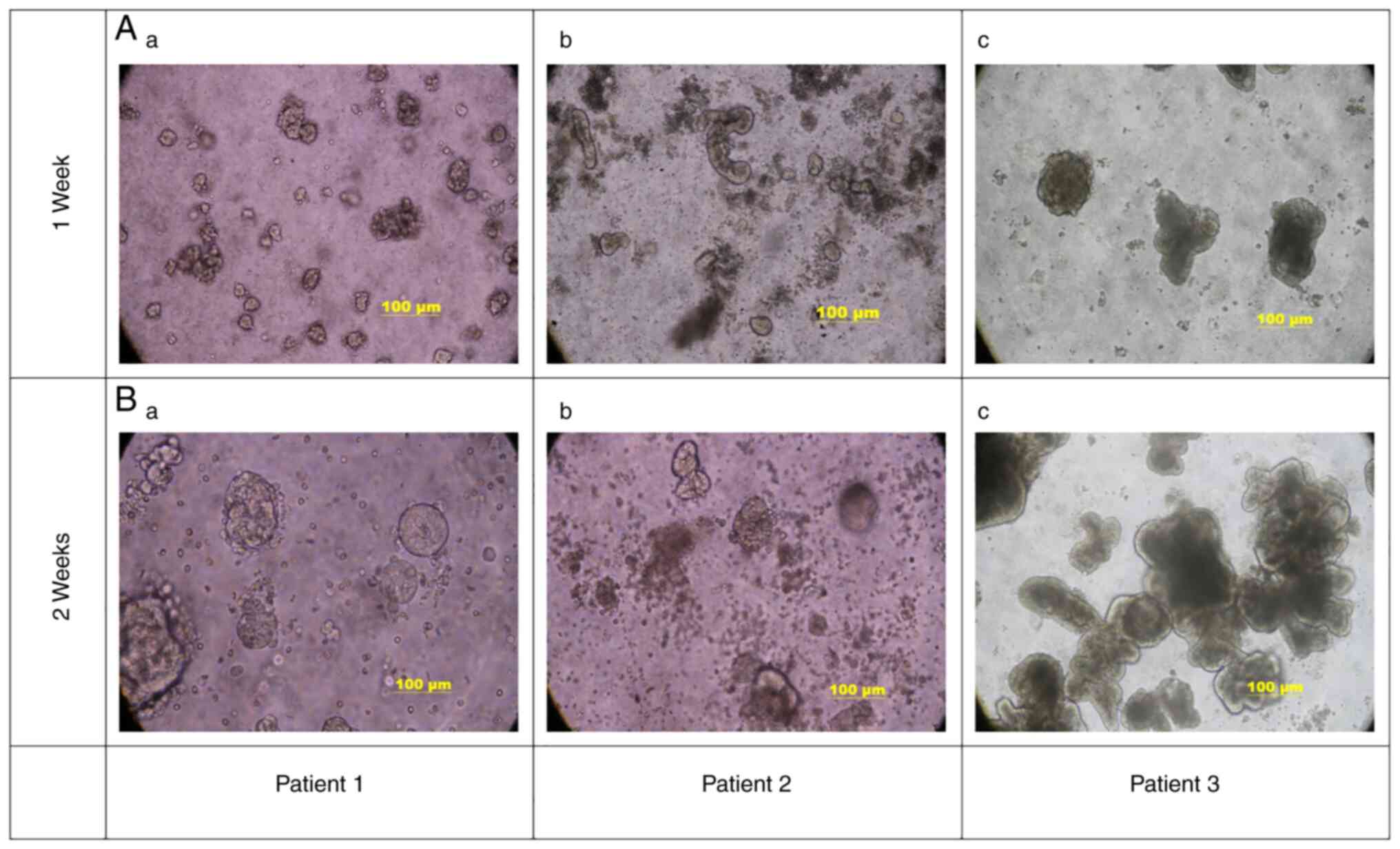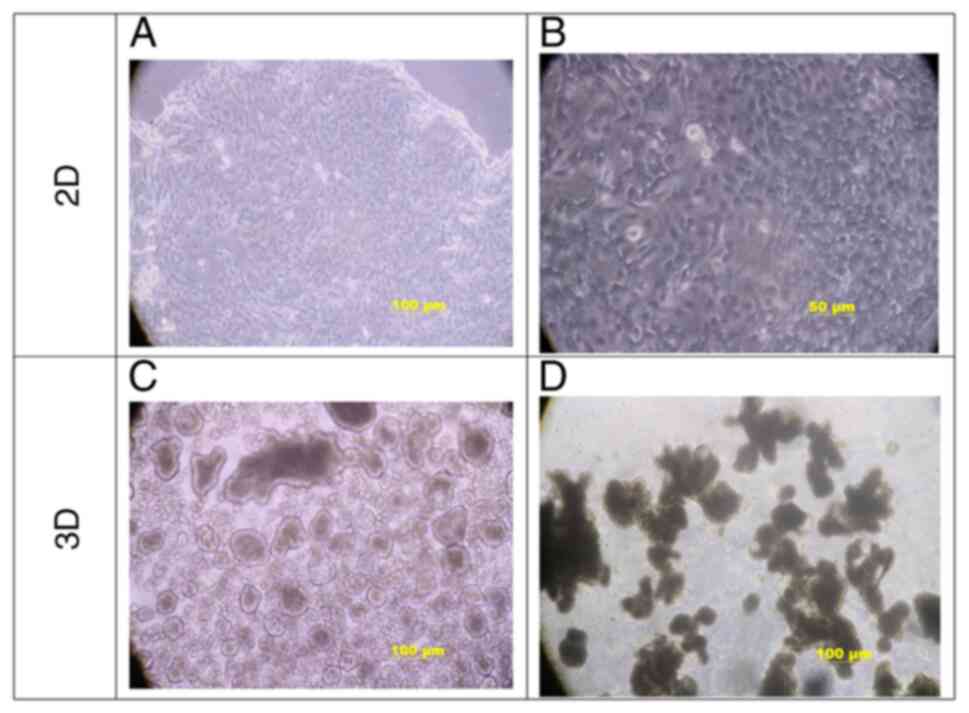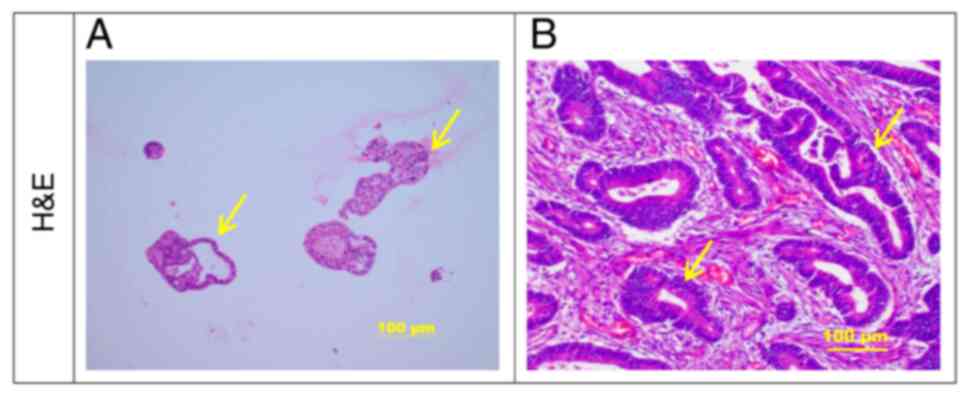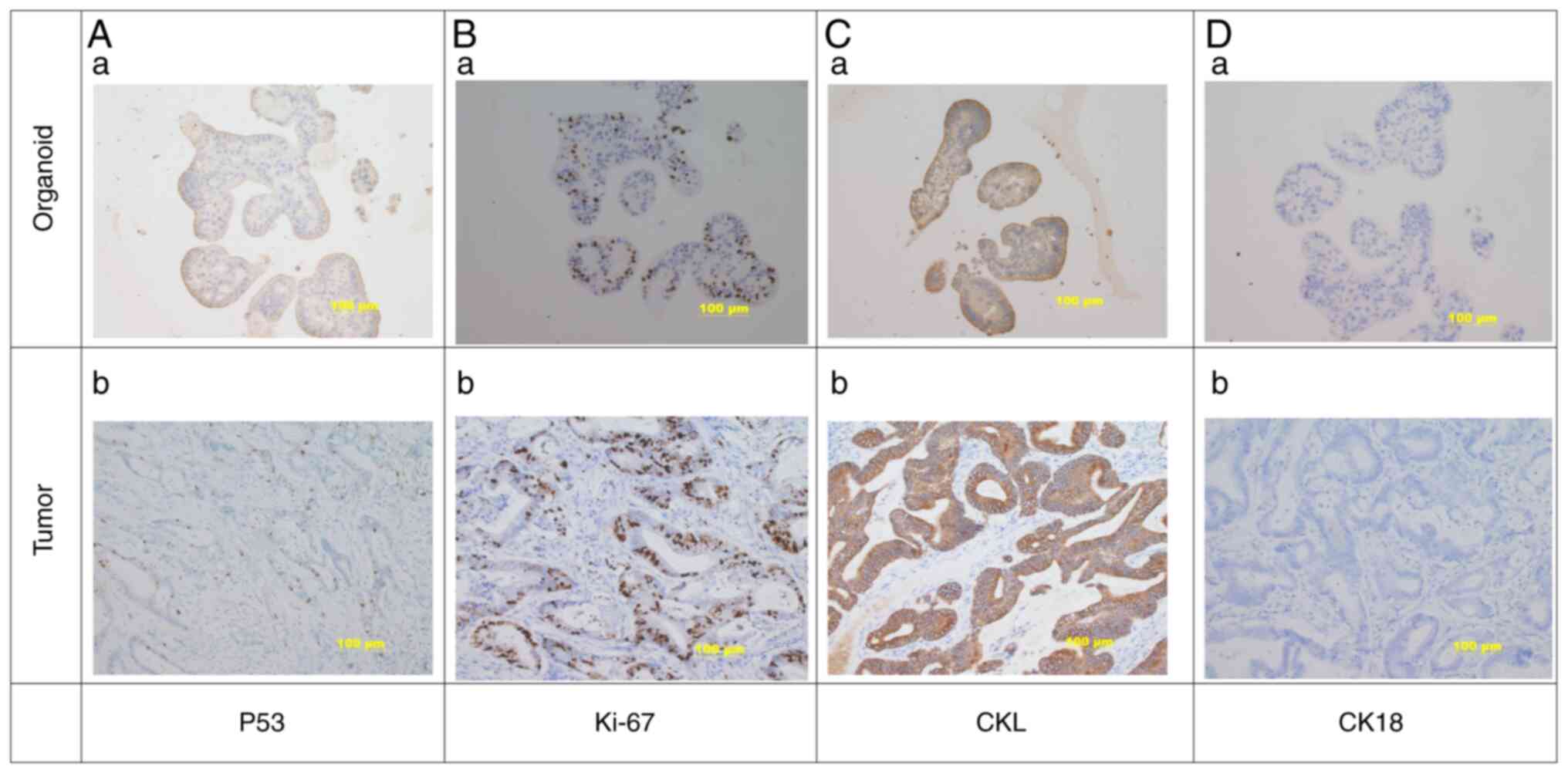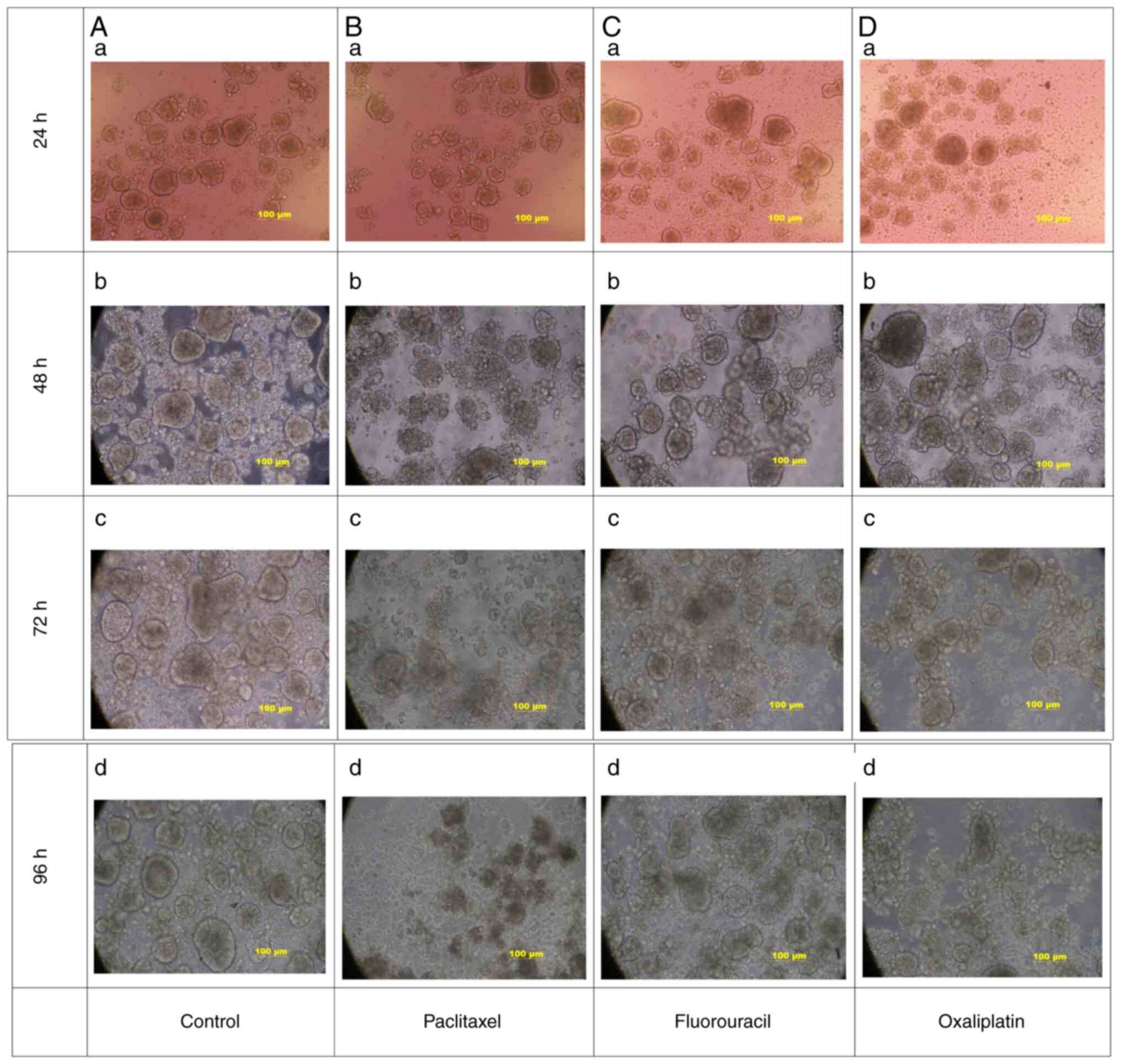|
1
|
Steele NG, Chakrabarti J, Wang J, Biesiada
J, Holokai L, Chang J, Nowacki LM, Hawkins J, Mahe M, Sundaram N,
et al: An organoid-based preclinical model of human gastric cancer.
Cell Mol Gastroenterol Hepatol. 7:161–184. 2019. View Article : Google Scholar : PubMed/NCBI
|
|
2
|
Malvezzi M, Bonifazi M, Bertuccio P, Levi
F, La Vecchia C, Decarli A and Negri E: An age-period-cohort
analysis of gastric cancer mortality from 1950 to 2007 in Europe.
Ann Epidemiol. 20:898–905. 2010. View Article : Google Scholar : PubMed/NCBI
|
|
3
|
Bray F, Ferlay J, Soerjomataram I, Siegel
RL, Torre LA and Jemal A: Global cancer statistics 2018: GLOBOCAN
estimates of incidence and mortality worldwide for 36 cancers in
185 countries. CA Cancer J Clin. 68:394–424. 2018. View Article : Google Scholar : PubMed/NCBI
|
|
4
|
Ferlay J, Colombet M, Soerjomataram I,
Mathers C, Parkin DM, Piñeros M, Znaor A and Bray F: Estimating the
global cancer incidence and mortality in 2018: GLOBOCAN sources and
methods. Int J Cancer. 144:1941–1953. 2019. View Article : Google Scholar : PubMed/NCBI
|
|
5
|
Ahmad SA, Xia BT, Bailey CE, Abbott DE,
Helmink BA, Daly MC, Thota R, Schlegal C, Winer LK, Ahmad SA, et
al: An update on gastric cancer. Curr Probl Surg. 53:449–490. 2016.
View Article : Google Scholar : PubMed/NCBI
|
|
6
|
Gunturu KS, Woo Y, Beaubier N, Remotti HE
and Saif MW: Gastric cancer and trastuzumab: First biologic therapy
in gastric cancer. Ther Adv Med Oncol. 5:143–151. 2013. View Article : Google Scholar : PubMed/NCBI
|
|
7
|
Yano T, Doi T, Ohtsu A, Boku N, Hashizume
K, Nakanishi M and Ochiai A: Comparison of HER2 gene amplification
assessed by fluorescence in situ hybridization and HER2 protein
expression assessed by immunohistochemistry in gastric cancer.
Oncol Rep. 15:65–71. 2006.PubMed/NCBI
|
|
8
|
Abrahão-Machado LF, Jácome AA, Wohnrath
DR, dos Santos JS, Carneseca EC, Fregnani JH and Scapulatempo-Neto
C: HER2 in gastric cancer: Comparative analysis of three different
antibodies using whole-tissue sections and tissue microarrays.
World J Gastroenterol. 19:6438–6446. 2013. View Article : Google Scholar : PubMed/NCBI
|
|
9
|
Manion E, Hornick JL, Lester SC and Brock
JE: A comparison of equivocal immunohistochemical results with
anti-HER2/neu antibodies A0485 and SP3 with corresponding FISH
results in routine clinical practice. Am J Clin Pathol.
135:845–851. 2011. View Article : Google Scholar : PubMed/NCBI
|
|
10
|
Domcke S, Sinha R, Levine DA, Sander C and
Schultz N: Evaluating cell lines as tumour models by comparison of
genomic profifiles. Nat Commun. 4:21262013. View Article : Google Scholar : PubMed/NCBI
|
|
11
|
Ertel A, Verghese A, Byers SW, Ochs M and
Tozeren A: Pathway-specifific differences between tumor cell lines
and normal and tumor tissue cells. Mol Cancer. 5:552006. View Article : Google Scholar : PubMed/NCBI
|
|
12
|
Gillet JP, Calcagno AM, Varma S, Marino M,
Green LJ, Vora MI, Patel C, Orina JN, Eliseeva TA, Singal V, et al:
Redefifining the relevance of established cancer cell lines to the
study of mechanisms of clinical anti-cancer drug resistance. Proc
Natl Acad Sci USA. 108:18708–18713. 2011. View Article : Google Scholar : PubMed/NCBI
|
|
13
|
Sandberg R and Ernberg I: Assessment of
tumor characteristic gene expression in cell lines using a tissue
similarity index (TSI). Proc Natl Acad Sci USA. 102:2052–2057.
2005. View Article : Google Scholar : PubMed/NCBI
|
|
14
|
Stein WD, Bates SE and Fojo T: Intractable
cancers: The many faces of multidrug resistance and the many
targets it presents for therapeutic attack. Curr Drug Targets.
5:333–346. 2004. View Article : Google Scholar : PubMed/NCBI
|
|
15
|
Vlachogiannis G, Hedayat S, Vatsiou A,
Jamin Y, Fernández-Mateos J, Khan K, Lampis A, Eason K, Huntingford
I, Burke R, et al: Patient-derived organoids model treatment
response of metastatic gastrointestinal cancers. Science.
359:920–926. 2018. View Article : Google Scholar : PubMed/NCBI
|
|
16
|
Seidlitz T, Koo BK and Stange DE: Gastric
organoids-an in vitro model system for the study of gastric
development and road to personalized medicine. Cell Death Differ.
28:68–83. 2021. View Article : Google Scholar : PubMed/NCBI
|
|
17
|
Seidlitz T, Merker SR, Rothe A, Zakrzewski
F, von Neubeck C, Grützmann K, Sommer U, Schweitzer C, Schölch S,
Uhlemann H, et al: Human gastric cancer modelling using organoids.
Gut. 68:207–217. 2019. View Article : Google Scholar : PubMed/NCBI
|
|
18
|
Nanki K, Toshimitsu K, Takano A, Fujii M,
Shimokawa M, Ohta Y, Matano M, Seino T, Nishikori S, Ishikawa K, et
al: Divergent Routes toward Wnt and R-spondin Niche Independency
during Human Gastric Carcinogenesis. Cell. 174:856–869.e17. 2018.
View Article : Google Scholar : PubMed/NCBI
|
|
19
|
Yan HHN, Siu HC, Law S, Ho SL, Yue SSK,
Tsui WY, Chan D, Chan AS, Ma S, Lam KO, et al: A comprehensive
human gastric cancer organoid biobank captures tumor subtype
heterogeneity and enables therapeutic screening. Cell Stem Cell.
23:882–897.e11. 2018. View Article : Google Scholar : PubMed/NCBI
|
|
20
|
Peraldo-Neia C, Massa A, Vita F, Basiricò
M, Raggi C, Bernabei P, Ostano P, Casorzo L, Panero M, Leone F, et
al: A novel multidrug-resistant cell line from an Italian
intrahepatic cholangiocarcinoma patient. Cancers (Basel).
13:20512021. View Article : Google Scholar : PubMed/NCBI
|
|
21
|
Varamo C, Peraldo-Neia C, Ostano P,
Basiricò M, Raggi C, Bernabei P, Venesio T, Berrino E, Aglietta M,
Leone F and Cavalloni G: Establishment and characterization of a
new intrahepatic cholangiocarcinoma cell line resistant to
gemcitabine. Cancers (Basel). 11:5192019. View Article : Google Scholar : PubMed/NCBI
|
|
22
|
Wang FH, Shen L, Li J, Zhou ZW, Liang H,
Zhang XT, Tang L, Xin Y, Jin J, Zhang YJ, et al: The Chinese
Society of Clinical Oncology (CSCO): Clinical guidelines for the
diagnosis and treatment of gastric cancer. Cancer Commun (Lond).
39:102019. View Article : Google Scholar : PubMed/NCBI
|
|
23
|
Hunt RH, Camilleri M, Crowe SE, El-Omar
EM, Fox JG, Kuipers EJ, Malfertheiner P, McColl KE, Pritchard DM,
Rugge M, et al: The stomach in health and disease. Gut.
64:1650–1668. 2015. View Article : Google Scholar : PubMed/NCBI
|
|
24
|
Al-Batran SE, Hofheinz RD, Pauligk C, Kopp
HG, Haag GM, Luley KB, Meiler J, Homann N, Lorenzen S, Schmalenberg
H, et al: Histopathological regression after neoadjuvant docetaxel,
oxaliplatin, fluorouracil, and leucovorin versus epirubicin,
cisplatin, and fluorouracil or capecitabine in patients with
resectable gastric or gastro-oesophageal junction adenocarcinoma
(FLOT4-AIO): Results from the phase 2 part of a multicentre,
open-label, randomised phase 2/3 trial. Lancet Oncol. 17:1697–1708.
2016. View Article : Google Scholar : PubMed/NCBI
|
|
25
|
Seidlitz T and Stange DE: Gastrointestinal
cancer organoids-applications in basic and translational cancer
research. Exp Mol Med. 53:1459–1470. 2021. View Article : Google Scholar : PubMed/NCBI
|
|
26
|
Lau HCH, Kranenburg O, Xiao H and Yu J:
Organoid models of gastrointestinal cancers in basic and
translational research. Nat Rev Gastroenterol Hepatol. 17:203–222.
2020. View Article : Google Scholar : PubMed/NCBI
|
|
27
|
Xu H, Jiao D, Liu A and Wu K: Tumor
organoids: Applications in cancer modeling and potentials in
precision medicine. J Hematol Oncol. 15:582022. View Article : Google Scholar : PubMed/NCBI
|
|
28
|
Günther C, Winner B, Neurath MF and
Stappenbeck TS: Organoids in gastrointestinal diseases: From
experimental models to clinical translation. Gut. 71:1892–1908.
2022. View Article : Google Scholar : PubMed/NCBI
|
|
29
|
Sun L, Wang Y, Cen J, Ma X, Cui L, Qiu Z,
Zhang Z, Li H, Yang RZ, Wang C, et al: Modelling liver cancer
initiation with organoids derived from directly reprogrammed human
hepatocytes. Nat Cell Biol. 21:1015–1026. 2019. View Article : Google Scholar : PubMed/NCBI
|
|
30
|
Stroulios G, Stahl M, Elstone F, Chang W,
Louis S, Eaves A, Simmini S and Conder RK: Culture Methods to Study
Apical-Specific Interactions using Intestinal Organoid Models. J
Vis Exp. 23((169))2021.PubMed/NCBI
|
|
31
|
Peng J, Xu H and Cai J: Establishment and
characterization of a new gastric cancer cell line, XGC-1. Cancer
Cell Int. 20:4372020. View Article : Google Scholar : PubMed/NCBI
|
|
32
|
Xu H, Peng JG, Zhuang YF, Chen JJ, Luo QC,
Huang WF, Lin CD and Cai JC: Establishment and characterization of
an expanding-type gastric cancer cell line by Ming's
classification. Oncol Rep. 36:3030–3036. 2016. View Article : Google Scholar : PubMed/NCBI
|
|
33
|
Tiriac H, Belleau P, Engle DD, Plenker D,
Deschênes A, Somerville TDD, Froeling FEM, Burkhart RA, Denroche
RE, Jang GH, et al: Organoid profiling identifies common responders
to chemotherapy in pancreatic cancer. Cancer Discov. 8:1112–1129.
2018. View Article : Google Scholar : PubMed/NCBI
|
|
34
|
Li G, Ma S, Wu Q, Kong D, Yang Z, Gu Z,
Feng L, Zhang K, Cheng S, Tian Y, et al: Establishment of gastric
signet ring cell carcinoma organoid for the therapeutic drug
testing. Cell Death Discov. 8:62022. View Article : Google Scholar : PubMed/NCBI
|















